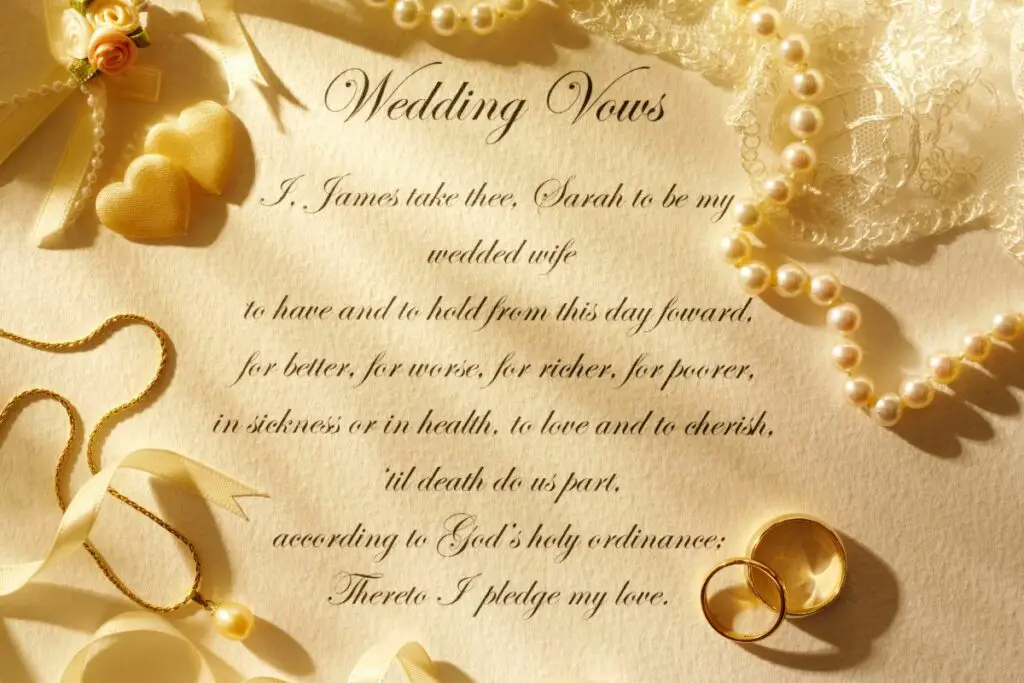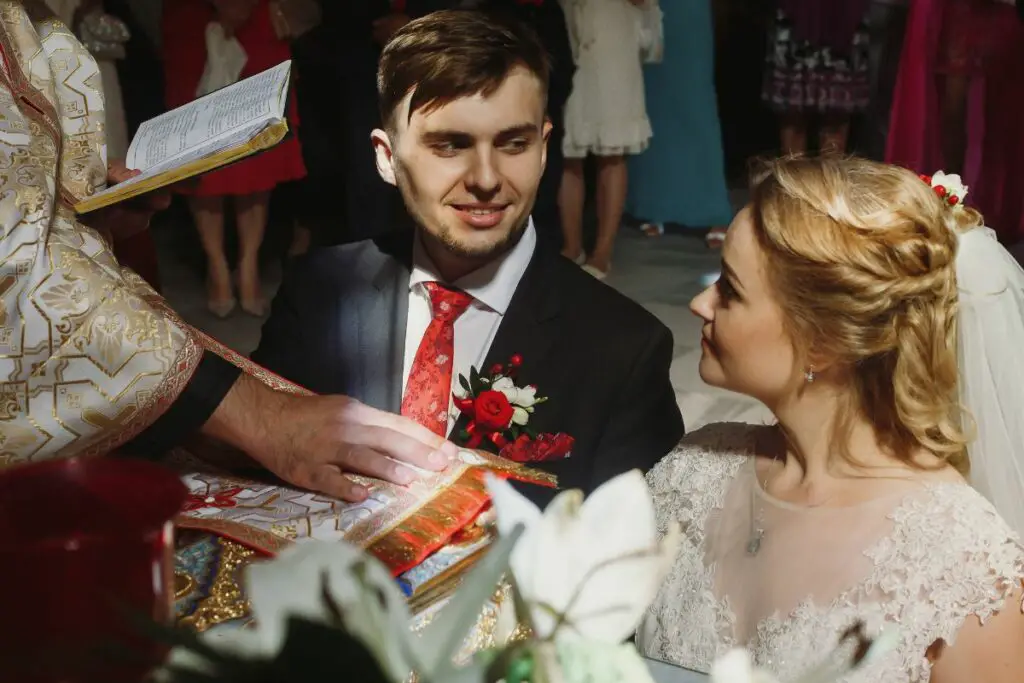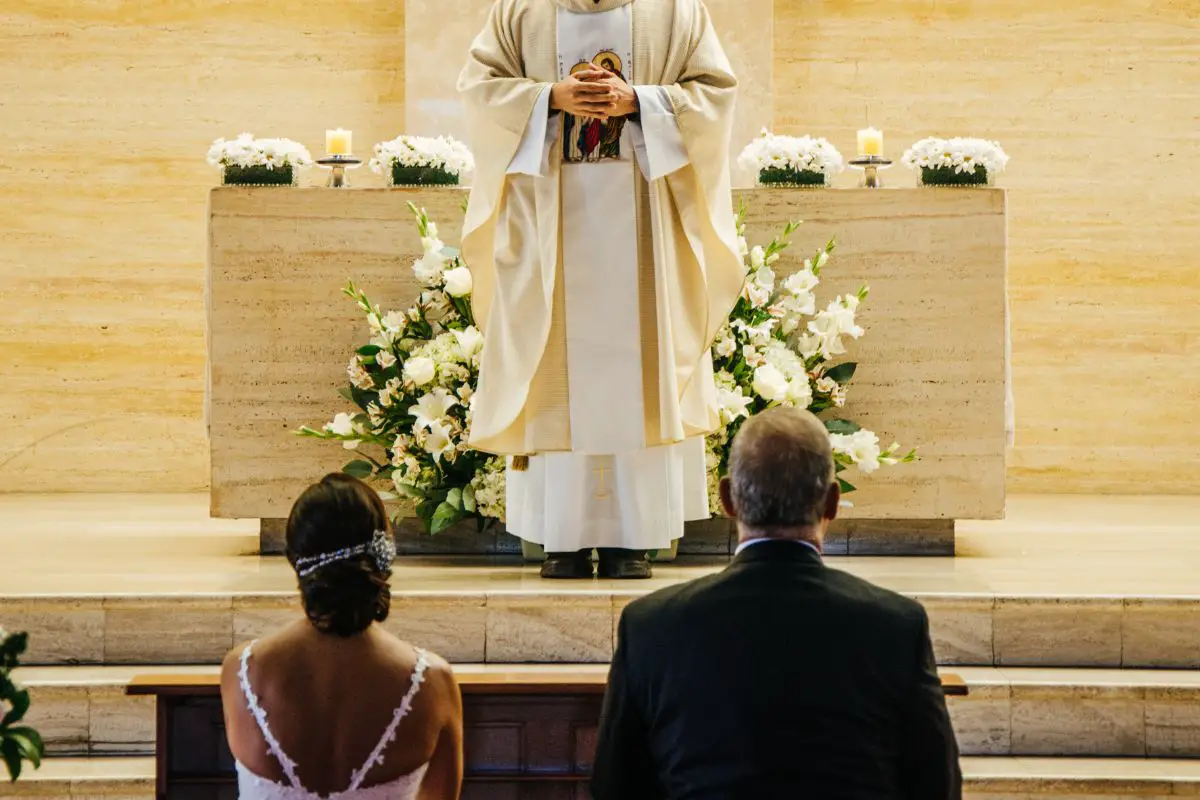Catholics have their traditions when it comes to giving out vows. They have to be said in a particular manner to show respect and reverence for the sacrament of matrimony. But, some Catholic communities allow couples to have their own spin on the longstanding practice.
Catholics cannot personalize their wedding vows during the ceremony as the traditional scripted vow is protected by tradition. However, couples can recite personalized vows during the wedding reception or their private time together.
This article will elaborate on how Catholics write and recite their vows at church. I will also guide you on how to write vows on your own, the Catholic way. Don’t worry; I will provide many examples for you to take inspiration from for your wedding, so let’s begin.
What Are Catholic Wedding Vows?
Catholics hold the sacrament of matrimony in very, very high regard. In 2004, Chile became among the last countries to legalize divorce, for conservative Catholic lawmakers were holding it back.
As of 2022, only two countries remain that have yet to legalize the process – the Philippines, another predominantly Catholic nation, and Vatican City, the seat of Roman Catholicism itself.
For Catholics, matrimony is one of the seven sacraments. As you may know, each sacrament is a visible sign of God’s grace. So through the sacrament of matrimony, the couple themselves become an extension of God’s love.
The value ascribed to marriage is perhaps why Catholic-dominant countries find it hard to say yes to divorce.
This bond is also further affirmed during the ceremony when couples exchange vows. Pronouncing your vows is a crucial part of the ceremony as it verbally demonstrates your deep love and commitment to one another.
The vows are cemented and validated by the presence of witnesses in the form of wedding guests. Vows can take various versions but what’s essential is that it has to come from the heart.
Love and commitment, for Catholics, should be the foundation of any marriage. This foundation is shown by the four criteria distinguishing Catholic marriages from other marriage forms.
First, both individuals must enter the marriage free to commit to their chosen spouse.
There must be no recognized blockages to the union. For instance, the couple can’t be closely related or should not have already vowed to marry someone else. Neither the husband nor wife-to-be should have vowed to be a part of the holy order.
Second, they have to give each other their consent on their own. No other individual can force them to marry each other. The only binding force should be love in a Catholic marriage.
The third is the understanding that the couple will enter into a lifelong commitment. Catholic weddings are binding ceremonies that emphasize living a life of fidelity to your partner. Children are also encouraged to further strengthen the bond.
Finally, a Catholic wedding has to have an exchange of vows witnessed by everyone. As I’ve mentioned, the sacrament of marriage is an extension of God’s grace, not just for the couple but for the communities around them.
As such, Catholics tend to place high regard on vows and how they are written and recited.
Writing Your Own Catholic Vows

Catholicism heavily discourages the personalization of your wedding vows. This dismissal of personalization is because the sacrament is heavily rooted in hundreds and hundreds of years of tradition and cannot be simply altered.
Remember, Christ is extending his love for the couple and the community through the wedding ceremony. The focus is less on the couple expressing their love for each other and more on His spirit and how weddings have brought two families together in God’s love.
If you attempt to add some quips and jokes to your vows at the ceremony, you may have trouble with the marriage officials. As such, it would be better to stick to the traditional script.
As you may know, Catholic weddings have crucial elements, which I have explained earlier. These elements are evident in the priest’s questions before the couple delivers their vows.
Here is what the priest would say before the vows.
“[Spouse 1] and [Spouse 2], have you come here to enter into marriage without coercion, freely and wholeheartedly?”
For this, you will have to answer, “I have.”
“Are you prepared, as you follow the path of marriage, to love and honor each other for as long as you both shall live?”
For this, you will have to answer, “I am.”
“Are you prepared to accept children lovingly from God and to bring them up according to the law of Christ and his Church?”
For this, you will have to answer, “I am.”
After this exchange with the priest, you will now have to face each other to recite the traditional Catholic vows:
“I, [Spouse 1], take you, [Spouse 2], to be my wife/husband. I promise to be true to you in good times and in bad, in sickness and in health. I will love you and honor you all the days of my life.”
The Vatican approves this template. Another approved template is as follows.
“I, [Spouse 1], take you, [Spouse 2], for my lawful wife/husband, to have and to hold, from this day forward, for better, for worse, for richer, for poorer, in sickness and in health, until death does us part.”
As you may know, for both versions, the response is “I do.”
If the officiators deem the vow part of being erroneous, they can deem the entire marriage void. So, don’t try anything funny!
Personalizing Your Wedding Vows

If you want to express your love for your significant other in a fun and personalized way, you can still do so during the reception or on your own private time as a couple.
Expressing your love during a reception shows off your identity as a couple. It makes everyone more confident in the stability of your partnership. Here are some pointers for you to follow to make memorable vows on your wedding day.
Makes Sure Your Vows Come From the Heart
The first piece of advice I would have for you is to come in without the intention of reading from a paper or your smartphone on the wedding day. While reading would save you the hassle of memorizing, it would be much more special if you said your vows from the heart.
Keep Your Vows Short
I always advise couples to keep their wedding vows short. The important thing is for you to genuinely communicate your love for one another.
Here are some great examples of short vows.
- “I vow to give you nothing short of the love you deserve for making me the happiest person in the world.”
- “I want everyone here to know that I vow never to make you feel alone again.”
- “I vow to give my all every day to save you from all your sorrows and shield you from all the pains.”
- “I promise to make you fall in love with me more and more each day.”
- “I vow to be the most reliable and genuine ally in all the many battles you will face throughout this lifetime.”
Yes, vows tend to be hyperbolic, but that’s the great part about them. It affirms your commitment to your loved one. You can show that your love is willing to transcend the realm of possibilities, which fits perfectly with Catholicism’s rigid regard for commitment.
Now, as much as I advise having short vows, you wouldn’t want it to be too short that it makes everyone doubt your commitment to one another. A reasonable minimum would be around 5 minutes of talk time, and a reasonable maximum is 7 minutes.
Have a Good Vow Intro
There are many ways to start your vow intro. You can either begin by thanking the guests for coming or ease into the vows by starting with a story.
Here are some examples of how to begin.
- “I am truly delighted that you are all here to celebrate the love between my spouse and me. Thank you, everyone, for taking the time out of your days to be with us; it truly means a lot.”
- “I first met my spouse on a hiking trip with some friends. I expected to see picturesque mountains and hills. As beautiful as they were, the sight of my wife/husband surpassed their beauty.”
Mention How Your Relationship Developed
Everyone loves a good story, and it’s sweet to hear how relationships developed. Let the audience peer into the dynamic of your relationship and make your vow recital more intimate by saying how you two met or how you two fell in love.
Here are some examples.
- “In 2019, I was unemployed, broke and had nothing else to look forward to every day. I didn’t even know how I had the guts to talk to the most beautiful girl in the room. But I guess you saw something good in me, and I thank God for giving me the courage to take the greatest leap of my life.”
- “On the morning after our 3rd Anniversary, and you were making pancakes, the sun hit your face so precisely, and I looked into the eyes of the most beautiful guy in the world. And I know this is shallow, but at that moment, I realized you were the only person I would want to wake up next to every day.”
- “I didn’t think I could fall in love again. After being hurt so many times, I just couldn’t trust anyone. But the goodness you’ve shown me during my times of struggle made me believe in love again. It made me believe in people again.”
As much as you’re free to play with your wedding vows, you would want to keep them family-friendly. It’s still a Catholic wedding, and some of your more conservative family members may take offense to the more racy things you say.
Pour Out Your Emotions in the Vow Proper
It would be great if you could use your story to tease everyone about where the vow recital is going. You can begin letting your emotions out when you’re done with the story.
This emotional component is the most crucial part of the vows and is usually where everyone feels what you’re communicating.
Some people may advise writing this part first, but I think it works best when you reflect on how your relationship has developed before writing your vows.
While I can’t say what you can write for this part, here are some examples to help you out.
- “I pledge to become a better version of myself each day, fuelled by the love you shower upon me. I promise to be the first one to celebrate your wins and the first one to help you up in times of trouble. I promise to spend the rest of my days fully devoted to you, the love of my life.”
You can even integrate excerpts from the Bible. This example integrates the famous verse from 1 Corinthians chapter 13:
- “I vow to show you love in its purest form. I vow to be patient and kind, to not envy or boast, and to not be arrogant or rude. I vow not to insist in my own way; to not be irritable or resentful; to not rejoice at wrongdoing but to rejoice with the truth.”
You can also add character to your vows by telling some jokes. This lets everyone know how your dynamic is as a couple. End your vows with a simple ‘I love you” or an intimate gesture such as a kiss.
Conclusions
Catholics tend to be more rigid regarding vows, as they treat marriage as a manifestation of Christ’s love. However, this does not completely stop you from personalizing vows, as you can still make time for it during the reception. The most important thing is that what you say during the wedding is authentic and comes from the heart.
- Say ‘I Do’ with a Woof: 10 Adorable Golden Retriever Wedding Cake Topper Ideas! - December 10, 2024
- Bridal Set Vs Engagement Ring: An In-depth Guide to Help You Decide - October 14, 2023
- Unveiling the Heart of Filipino Weddings: Fascinating Traditions and Rituals - September 25, 2023




Leave a Comment